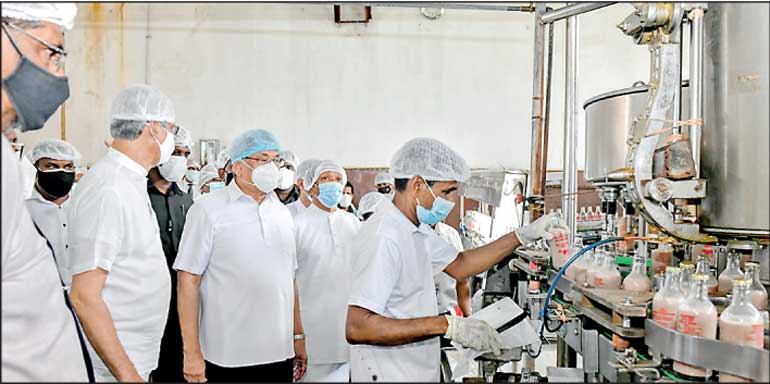Monday Feb 16, 2026
Monday Feb 16, 2026
Saturday, 26 February 2022 01:28 - - {{hitsCtrl.values.hits}}
 President Gotabaya Rajapaksa tours the Milco Factory in Narahenpita yesterday
President Gotabaya Rajapaksa tours the Milco Factory in Narahenpita yesterday
In a bid to empower the dairy farm industry and to promote liquid milk consumption President Gotabaya Rajapaksa yesterday instructed Agriculture Minister Mahindananda Aluthgamage and Livestock, Farm Promotion and Dairy and Egg Related Industries State Minister D.B. Herath to take immediate action to remove the price disparity in the liquid milk purchases.
“The entire process of purchasing liquid milk should be fully monitored to prevent irregularities by intermediaries. The dairy farmers should be paid a standard price with no disparity at the district level purchase,” he said, following an inspection visit to the Milco Factory in Narahenpita yesterday.
However, the President asserted that the move should not reflect in an upward price revision and burden the consumer.
President Rajapaksa inspected the Milco production facility from the liquid milk collection point to various processes of making dairy products.
The National Dairy Development Board was established in 1956 and it was transformed into Milco Ltd., in 1986. In the first phase, the company limited itself to producing pasteurised milk, but it has now expanded its manufacturing process to include milk and dairy products such as yogurt, ice cream, butter, ghee and skimmed milk.
With a staff of around 1,500 in four factories located in Ambewela, Digana, Polonnaruwa and Narahenpita — the company has a daily milk capacity of 700,000 litres and the current milk collection is limited to 120,000 litres. President Rajapaksa directed officials to develop the Milco Factory at Narahenpita as the main centre for the factories’ milk, whilst instructing to take underutilised lands under the National Livestock Development Board (NLDB) to cultivate grass for animal feed.
It was also pointed out that the Government of Denmark was investing € 600 million to setup a dairy factory in Badalgama to expand production capacities, which was scheduled to commence operations in September.
The Milco management pointed out that it was continuing its operations for the welfare of the dairy farmers.
A total of 8.5 litres of liquid milk is required to produce a kilo of powdered milk, which can only make 45 cups of milk. However, Milo officials emphasised that 2.5 litres of liquid milk could meet the same cups of milk, if fresh milk consumption is promoted.
Noting that consumption of fresh liquid milk was nutritious, he said the Government thus had been encouraging people to shift to it, which also stops a lot of foreign exchange being drained out of the economy to import powdered milk.